Using Volumetric Cube Mask
The Volumetric Cube Mask node allows you to create 3D masks within your scene, serving various purposes such as preventing certain areas from being keyed by the Reality Keyer or masking an area.
To set an example, assume that you have a large screen inside your cyclorama, and you want to display content on it. Given that the Reality Keyer will key the entire cyclorama, a specific method is required to mask an area within the 3D space. This is where the Volumetric Cube Mask node becomes a handy tool.
While this section utilizes the Green Screen Virtual Studio as an example pipeline, the approach can also be applied to XR (Extended Reality) projects or for calibration verification purposes.
Preparation Steps
- Construct your Green Screen Virtual Studio node network within the Reality Hub nodegraph.
Volumetric Cube Mask Connections
- Add
VolumetricCubeMaskandMergenodes to the nodegraph. - Connect the
Trackoutput pin of theXync(or your preferred tracking node) to theTrackinput of theVolumetricCubeMasknode. - Connect the
Outoutput pin ofDistortnode to theTexture0input pin of theMergenode. - Connect the
Outoutput pin of theVolumetricCubeMasknode to theTexture1input pin of theMergenode. - Connect the
Outoutput pin of theMergenode to theClean_Plate_Maskinput pin of theRealityKeyernode.

The VolumetricCubeMask node has been integrated into the nodegraph, and the necessary connections have been made, as shown above.
Adjust the transformation properties (Position, Rotation, etc.) of the Volumetric Cube Mask according to your studio setup.
- Activate the Advanced Preview Monitor (APM) Channel A on the
Maskoutput pin of theCycloramanode.
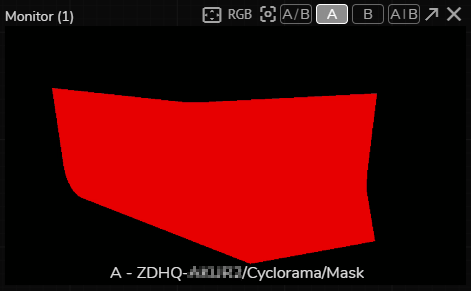
The displayed image indicates that the Mask color is red (1, 0, 0, 1).
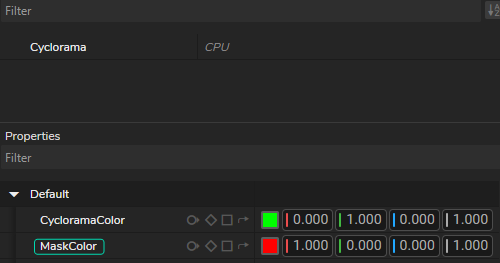
The Mask color is determined by the MaskColor property, as shown above.
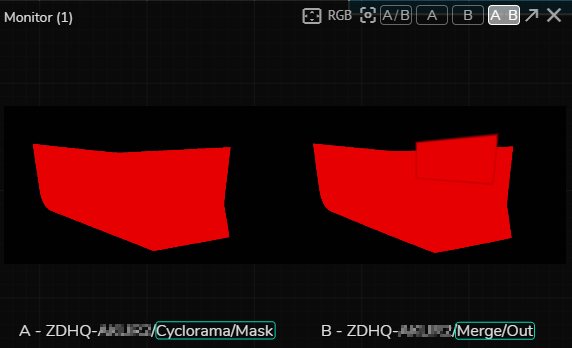
- Activate APM Channel B on the
Outoutput pin of theMergenode, and click on the APM Multiview (A|B) button.
The image above illustrates that the Cyclorama mask color matches the Volumetric Cube Mask color.
The edges around the VolumetricCubeMask are a result of the Smoothness setting.
Modifying Volumetric Cube Mask Settings
The next step involves subtracting the VolumetricCubeMask from the Cyclorama.
To do this:
- Select the
VolumetricCubeMasknode and navigate to itsColorproperty.
- Change the R value to 0 and set both G and B values to 1.
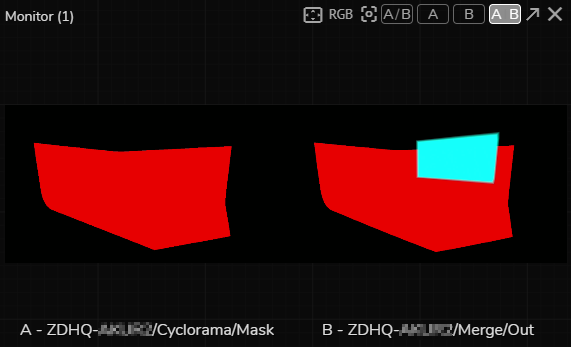
Now, the Volumetric Cube Mask appears magenta and does not contain any red color information. Therefore, the area it covers will not be keyed in the render.
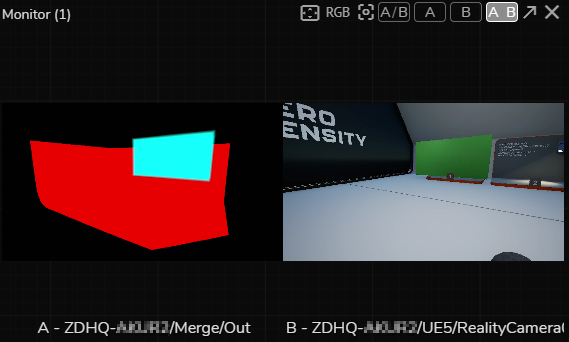
- Navigate to R
ealityCamera0.Sceneoutput and activate the APM.
As shown in the image, the scene is keyed based on the Cyclorama, excluding the area covered by the Volumetric Cube Mask.